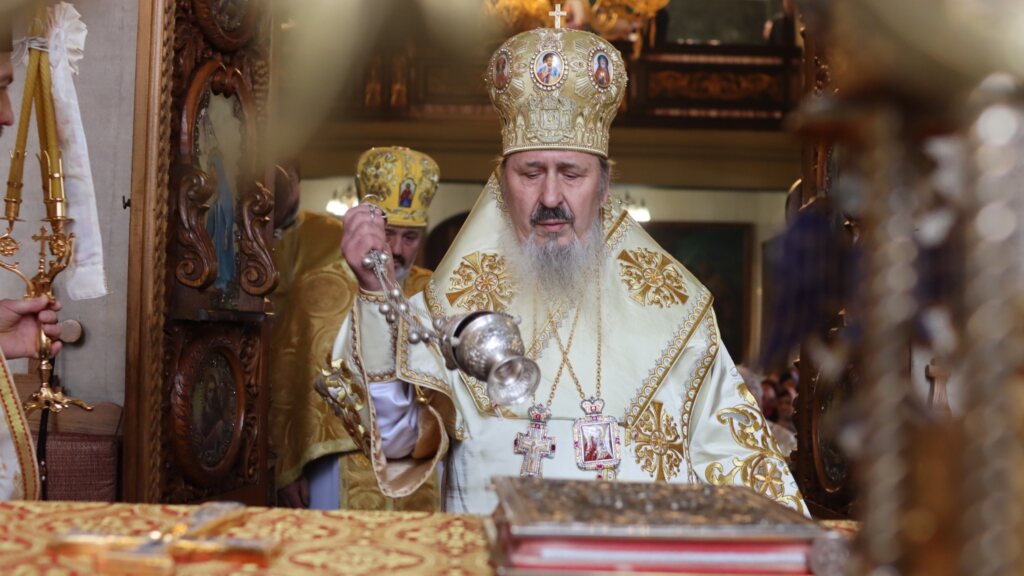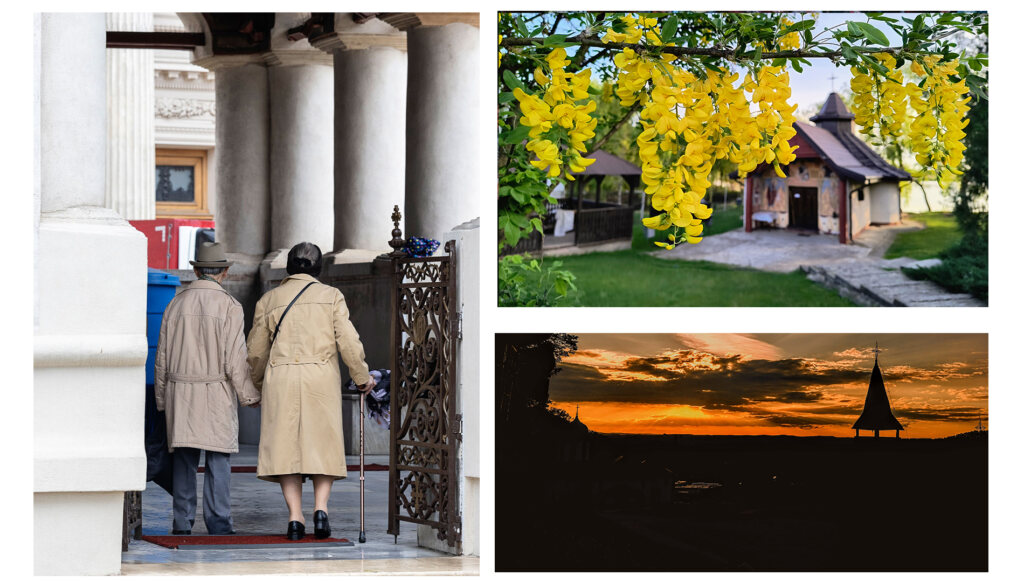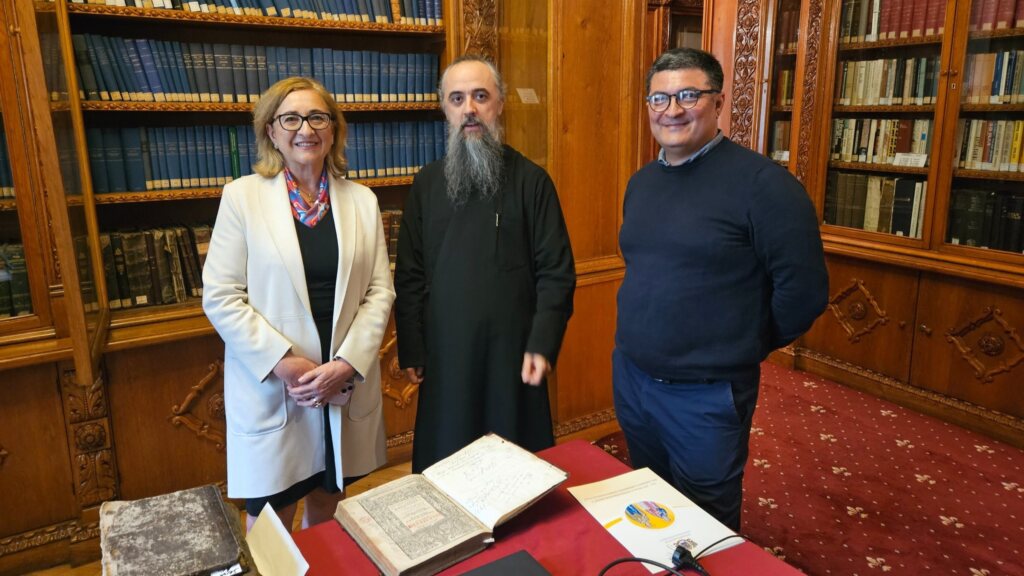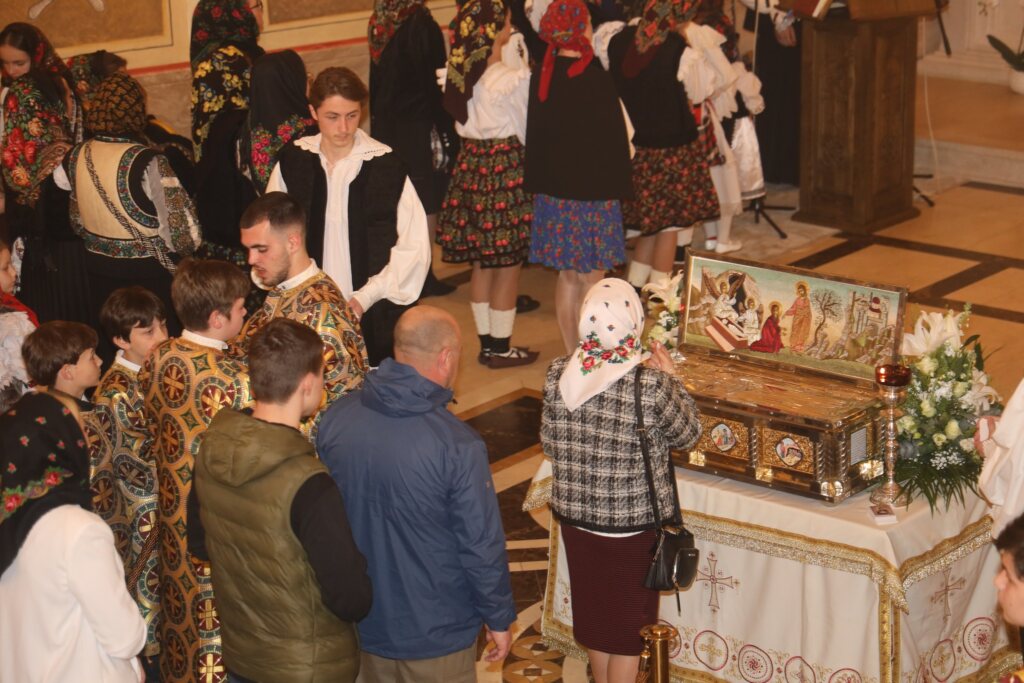His Beatitude Patriarch Daniel addressed the pilgrims on Monday upon the reception of the relics of St. Gregory Palamas at the Patriarchal Cathedral.
The relics were brought by a delegation of the Orthodox Church of Greece, led by Metropolitan Panteleimon of Veria, Naoussa and Kampania.
Patriarch Daniel’s address for welcoming the relics of Saint Gregory Palamas
Beloved pilgrims,
The year 2022, proclaimed by the Holy Synod of the Romanian Orthodox Church as a Solemn Year of Prayer in the Church’s life and the Christian’s life and a Commemorative Year of the Hesychast Saints Symeon the New Theologian, Gregory Palamas and Paisius (Velichkovsky) of Neamt, is a blessed time to progress in prayer as a state of encounter and conversation between man and God, as a source of sanctification in the Church and the family.
Saint Demetrius the New, Protector of Bucharest, whose patronal feast we celebrate these days, and Saint Gregory Palamas, whose relics were brought for veneration and blessing from the Metropolis of Veria, Naoussa and Kampania (Greece), along with the icon of St Gregory Palamas and the holy members of his family, unite us in ever deeper communion, learning from them both the power of prayer in solitude and prayer in family life.
These two types of prayer are evident not only in the writings of Saint Gregory Palamas but also in the life of his family: his parents, brothers, and sisters, a total of seven people, who were canonised by the Ecumenical Patriarchate in 2009 at the request of His Eminence Metropolitan Panteleimon of Veria, Naoussa, and Kampania.
Already during his tenure as protosyncellus (diocesan vicar) in Thessaloniki, His Eminence Metropolitan Panteleimon repatriated the relics of Saint Demetrius the Myrrh-gusher, which had been kept in Italy for 800 years.
Also from Italy, he brought the relics of Saint David the Dendrite. In 1994, he was elected Metropolitan of Veria, Naoussa and Kampania. As Metropolitan, he brought to Veria a particle of the relics of St Paul the Apostle. As Metropolitan of Veria, he also organises the international congress called Pavlia, dedicated to the Apostle Paul, which has reached its 28th edition this year.
Starting from the exhortation of the Apostle Paul: “Pray without ceasing!” (1 Thessalonians 5:17), St. Gregory Palamas shows in his writings how under the guidance of the Holy Spirit the prayer, “Lord, Jesus Christ, Son of God, have mercy on me a sinner”, called both “prayer of the mind” and “prayer of the heart”, has become the best way to enlighten the soul and sanctify the Christian’s life, whether in the solitude of the cell or in the communion of Christian houses.
In connection with unceasing or monological prayer, as it has been called, St. Gregory Palamas said that every Christian is bound to say it: “All who are called after Christ (all Christians), in whatever group they may be, must work prayer unceasingly, according to the apostolic exhortation “Pray without ceasing!” […]. Not only the monks outside the world, but also men, women, and infants, sages, and the uneducated, and all together should learn prayer in the same way, and to this end to put all their efforts.” (Philotheus Kokkinos, Encomium in honour of Saint Gregory Palamas, PG 151, 573 CD)
Beginning in the fourth century, via the practice of continuous prayer, the Church gave birth to hesychasm, which is the desire for prayer in solitude and vigilance, or the state of peace and spiritual delight in contrast to the frenetic world.
The life and work of St. Gregory Palamas (1296-1359) are linked to the official reception by Orthodoxy of Hesychasm and its importance for the Church in the 14th century (synods held in Constantinople in 1341, 1347 and 1351).
According to the account of St. Philotheus Kokkinos, Patriarch of Constantinople, St. Gregory Palamas learned the prayer of the heart from his father, Constantine, who was a dignitary of the imperial court and counsellor to Emperor Andronicus II the Palaeologus (1282-1328).
Although the father of St. Gregory Palamas was engaged with the affairs of the state, besides his family responsibilities, since he had a wife and five children, he remained inseparable from God through the unceasing prayer of the heart.
Gregory Palamas was only seven years old when his father died, and Emperor Andronicus II became the orphan’s guardian, guaranteeing that the child received a comprehensive education in philosophy and theology under the tutelage of the great philosopher and theologian Theodore Methochites.
Prior to his death, the father of Saint Gregory Palamas entered monasticism and was given the name Constantius, which he had always sought.
At age 20, after persuading his mother and two sisters to adopt the monastic life, Gregory departed for Mount Athos with his two brothers, all of whom had attained a high spiritual measure of life.
All members of the Palamas family were endowed with great virtues, which were fostered above all by unceasing prayer in their home.
Thus, the Palamas family gave our Church seven saints: Saint Constantius (the father), Saint Kalloni (the mother), Saint Gregory and his brothers: Saint Theodosius and Saint Macarius, as well as his sisters Saints Epicharis and Theodote.
Beloved pilgrims,
The exemplary life of the family of St. Gregory Palamas teaches us that the unceasing utterance of the prayer of the heart, accompanied by humility and repentance, leads us to spiritual advancement in holiness, culminating in the contemplation of the uncreated light or glory of the Most Holy Trinity, according to the promise of the Lord Christ: “Blessed are the pure in heart, for they shall see God” (Matthew 5:8).
Today, through the kindness of His Eminence Metropolitan Panteleimon of Veria, Naoussa and Kampania, whom we thank for his friendship and generosity, we can venerate not only Saint Demetrius the New, Protector of Bucharest, the Holy Emperors Constantine and Helen and Saint Nectarios of Aegina, whom we have for permanent veneration in the Patriarchal Cathedral, but also the relics of Saint Gregory Palamas and the icon of his holy family.
All these saints call us to be co-workers with the grace of God, through prayer and repentance, humility and mercy, to acquire peace of heart and holiness or likeness to the holy God, as the Holy Apostle Paul exhorts us, saying: “Make every effort to live in peace with everyone and to be holy; without holiness, no one will see the Lord” (Hebrews 12:14).
Beloved pilgrims, we pray God to bless you all, giving you peace and joy, health and much help in life!
† Daniel
Patriarch of the Romanian Orthodox Church
Photography courtesy of Basilica.ro / Mircea Florescu
Follow us on Twitter: @BasilicaNews






